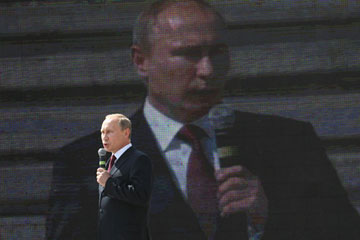
Russian President Vladimir Putin delivers a speech at the opening of the Barmaley Fountain on August 23, 2013 in Volgograd, Russia.
(6 of 7)
These regions lie at the center of Putin's vision of a Moscow-led free-trade zone and military alliance, his Eurasian Union, which Putin called "the will of the era." But he has found few volunteers among his neighbors. Apart from Kazakhstan, only Belarus and Armenia have agreed to a free-trade zone with Russia. Ukraine refused--and paid dearly for it. In August, after Kiev again rebuffed Putin's invitation to join the alliance, Russia blocked all Ukrainian imports, costing Ukraine's businesses as much as $2.5 billion. This type of economic blackmail has become Russia's favorite method of influencing its neighbors.
The other method involves groups like the Night Wolves. Although their tattoos and leather seem ill-suited for diplomacy, their aim is to unite Eastern Europe around the banners of the Orthodox Church and Slavic pride. They have chapters in Serbia, Macedonia, Romania, Belarus, Herzegovina, Ukraine and other parts of the Slavic world, making them natural allies, or "brothers," as Putin puts it when addressing their rallies. On a visit to Ukraine last summer, Putin kept his Ukrainian counterpart waiting for four hours while he took a detour to hang out with the Night Wolves. "We'll help you make this one country again," their leader, Zoldastanov, told Putin on the roadside, referring to Russia and Ukraine. Expressing his gratitude, Putin accepted a biker jacket embossed with the ancient creed of Slavic exceptionalism: with us is god.
Eastern Approaches
Over the northern gate of the Konstantin Palace in St. Petersburg, the venue for the G-20 summit, hangs an enormous two-headed eagle, Russia's imperial emblem, with one head facing east and the other facing west. Throughout its modern history, Russia has straddled the Asian and European continents, and the eagle's eastern gaze will be emphasized at the summit. Ksenia Yudaeva, Russia's representative at the G-20, knows which guest matters most: "As the G-20 sherpa I work with all the member states, but China is a partner with which we regularly coordinate our actions. After all, it is our closest partner, geographically and strategically."
Two weeks before the summit began, Yudaeva inspected the grounds of the palace from the front seat of a golf cart as the busts of Russian royalty flitted past. Turning around in her seat, she told me, "For many countries, but especially for Russia, China offers enormous strategic potential. America is only important in its ability to influence other countries." Trade with the U.S. makes up only 3.4% of Russia's total. That's less than half of Russia's trade with China, which amounted to $88 billion last year.
In March the new Chinese leader Xi Jinping chose Moscow as the destination for the first foreign trip of his tenure, and the massive military drills that Russia held in July were preceded by a round of war games with China in the Pacific. They were the biggest joint naval exercises Beijing had ever held with another country. In the U.N. Security Council, Russia and China have also been working in tandem, with an almost identical record of vetoes of Western resolutions in recent years, like the ones that blocked additional sanctions on Syria and Iran.
